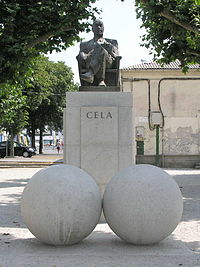Camilo José Cela
| Camilo José Cela | |
|---|---|

|
|
| Born | Camilo José Cela y Trulock 11 May 1916 Padrón, Galicia, Spain |
| Died | 17 January 2002 (aged 85) Madrid, Spain |
| Resting place | Iria Flavia cemetery |
| Occupation | Novelist, short story writer, essayist |
| Language | Spanish |
| Nationality | Spanish |
| Literary movement | Generation of '36 |
| Notable works | The Family of Pascual Duarte, The Hive |
| Notable awards |
Nobel Prize in Literature 1989 |
| Spouse | María del Rosario Conde Picavea (m. 1944-div. 1990) Marina Concepción Castaño López (m. 1991-2002) (his death) |
| Children | Camilo José Cela Conde |
Camilo José Cela y Trulock, 1st Marquis of Iria Flavia (Spanish: [kaˈmilo xoˈse ˈθela]; 11 May 1916 – 17 January 2002) was a Spanish novelist, short story writer and essayist associated with the Generation of '36 movement.
He was awarded the 1989 Nobel Prize in Literature "for a rich and intensive prose, which with restrained compassion forms a challenging vision of man's vulnerability".
Camilo José Cela was born in the rural parish of Iria Flavia, in Padrón, Province of A Coruña, Spain, on 11 May 1916. He was the oldest child of nine. His father, Camilo Crisanto Cela y Fernández, was Galician and his mother, Camila Emanuela Trulock y Bertorini, while also Galician, was of English and Italian ancestry. The family was upper-middle-class and Cela described his childhood as being "so happy it was hard to grow up."
From 1921 to 1925, he lived with his family in Vigo where they ended up leaving in order to go and live in Madrid. It was here Cela was able to study at a Piarist school. In 1931 he was diagnosed with tuberculosis and admitted to the sanatorium of Guadarrama where he took advantage of his free time to work on his novel, Pabellón de reposo. While recovering from the illness he began intensively reading works by José Ortega y Gasset and Antonio de Solís y Ribadeneyra.
The Spanish Civil War broke out in 1936 when Cela was 20 years old and just recovering from his illness. His political leanings were conservative and he was able to escape to the rebel zone and enlisted himself as a soldier but was wounded and hospitalized in Logroño.
...
Wikipedia
